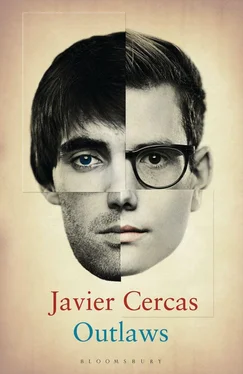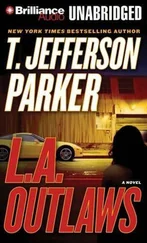‘Zarco laughed heartily and ordered a beer. What for? he answered. To sniff Tere’s tail, what else? I laughed too. Apart from that, I said. To give us a hand, he added. Because I tricked you. You tricked me? I asked with curiosity. Sure, he answered happily. You thought we were going to do a job on the old man from Vilaró. And you thought if we didn’t it was to do you a favour and that I had to stop Guille and all that. They served his beer, he drank it down in one and burped. You were a dupe, Gafitas, he said. I ordered two more glasses of beer and replied: And you were a son of a bitch. You only just noticed? Zarco laughed again. Anyway it was Tere’s idea. She said it would be better if you came with us of your own free will rather than against it. By the way, he added, have you seen her? Not lately, I said. How about you? Me neither, he said, and it sounded like the truth. And María? I asked. Sure, he said, and it sounded like a lie.
‘Our beer arrived. Zarco took a sip and reminded me of the double question I’d asked him at the start: what I’d joined his gang for, why I’d gone to La Font every afternoon. So I picked up the newspaper and handed it to him, folded open to the page with Batista’s photo on it. To get away from this guy, I said, pointing at the photo. While Zarco looked at Batista’s face and took sips of his beer, I tried to summarize the story. Fuck, man, he interrupted me halfway through. This guy really is a son of a bitch. I went on with the story. Finally I told him that I sometimes thought that deep down I’d never forgiven Batista, that sometimes, at weak moments, when I saw Batista so smug in the newspapers or on television, the memory of what had happened humiliated me and I sometimes regretted never having taken revenge on him, and at moments like that I felt that, if I could have got rid of him by pressing a button, I would have done it without a doubt.
‘That evening we didn’t talk about anything else and I ended up pretty drunk, but I didn’t mention it again over the following days; for his part, Zarco seemed to forget Batista. Then, two weeks later, it happened. That day a very agitated Gubau came into my office, saying he’d heard on the radio that Batista had just been stabbed at the door of his house in Montjuïc, a neighbourhood on the outskirts of the city. Over the course of the morning more news of the incident came in — Batista had been admitted to the Trueta hospital, where he was fighting for his life, he’d been stabbed seven times, nobody had seen his attacker — and around noon we heard that my old classmate had died.
‘Hours later Zarco showed up at my office, ready to go for a couple of beers at the Royal. Remember the guy I told you about the other day? I said as soon as I saw him. The bully of my school, I specified. Sure, he said. Somebody killed him this morning, I told him. Zarco looked at me and, seeing I wasn’t going to add anything, shrugged his shoulders and said: So what? What do you mean so what? I said. They stabbed him seven times. Not exciting enough for you? I was going to go on but I didn’t, because I had the feeling that an almost imperceptible smile was prowling about Zarco’s lips. At that moment I remembered that he left the prison every morning just before the time Batista had been murdered, and, dismayed by a sudden suspicion, I went over to my office door, pulled it shut and turned to him. Hey, I asked, lowering my voice. You wouldn’t have had anything to do with this, would you? He didn’t seem surprised by the question, but his smile widened and he turned his head from left to right. You’re too much, Gafitas, he reproached me. Did you or did you not have anything to do with it? I repeated. Zarco held my gaze, seemed to be thinking over his reply. And what if I did have something to do with it? he asked defiantly. Are you going to start crying over this son of a bitch now? A son of a bitch is a son of a bitch, Gafitas. Didn’t you tell me you regretted not having got revenge on him? It was just an expression, I answered. It’s one thing to say something and quite another. . I didn’t finish my sentence, I said: Batista was nobody, he hadn’t done anything. Ah, no? he answered. He fucked you right up, and when you were just a kid who didn’t know how to defend himself. That’s not doing anything? They locked me up inside for much less. He, on the other hand, never got touched. Well then, now justice has been done. After a pause he continued: And if I took care of it, all the better. Who’s going to suspect me, who never even met him? And who’s going to suspect you? A clean job, man, he concluded, opening his arms. Just like pressing a button. True or false? I was stunned, trying to process what I’d heard. Zarco pointed at me with his index finger and, as if urging me to say something, added: I scratch your back and you scratch mine, eh, Gafitas? The phrase snapped me out of my paralysis, and in two strides I stood a handspan from him; in the quiet of my office I heard the soles of my shoes squeak against the wooden floor. Tell me the truth, Antonio, I said. Did you have anything to do with it or not? Zarco was again slow to answer; his blue eyes bored into mine. Until he suddenly blinked, smiled broadly and patted me on the cheek. Of course not, dickhead, he finally said.
‘That was the last time Zarco and I talked of Batista, or of his murder. A murder that, as happens with so many, was never solved: the police arrived very soon at the conclusion that it had been the work of a professional, perhaps a hitman from some Latin-American country, but they didn’t find any trace of the murderer; the police investigated Batista’s relatives, friends and business competitors in search of a motive with the same degree of success. Until the case was filed away in the archives.’
‘Now I understand why you don’t want this story told in the book. Readers might think Zarco killed Batista.’
‘Maybe he did kill him. Or had him killed. Sometimes I think he did it, and by killing him thought he was doing me a favour, that it was his way of repaying me for what I was doing for him. But other times I think he couldn’t have killed him: that he had no money to hire a hitman (although the truth is that someone like him might not need money for that) and that he couldn’t have committed the murder so cleanly and he wouldn’t have had enough time, that morning, to get from the prison to Montjuïc and surprise Batista on his way out of his house (although the truth is that perhaps he would have had enough time and that Zarco probably knew how to kill as professionally as any hitman). I don’t know. And, now that I think of it, maybe you should recount this story in your book, just as I’ve told you: after all what it’s about is readers getting to know the truth about Zarco. And this, including my doubts, also forms part of the truth.’
‘Aren’t you afraid some readers might think you’re lying, or diluting or massaging the truth, and that it was you who induced Zarco to kill Batista, to get revenge without getting your hands dirty?’
‘Do you think I would have told you if I had? Besides, I didn’t want to get revenge on Batista, for me it was a forgotten story or almost forgotten, I’m not saying what I said to Zarco was entirely false, I’m only saying it was one of those things that get said sometimes when you have a few too many and nobody takes seriously, or a momentary and unimportant letting off steam, which I immediately regretted. . Anyway, do what you think best, or what’s best for your book: if you think it advisable, tell it; if not, don’t. Later we’ll see.
‘But getting back to our story, because the evenings of cheerful friendship and beers with Zarco at the bar of the Royal soon came to an end. Practically from one day to the next the friendship and good cheer evaporated and Zarco’s head betrayed him again; or that’s the impression I had: that the persona had once again got the better of the person. Before, during my visits in the interview room at the prison, it was common for Zarco to complain about his lack of freedom, of the stupidity of the regulations or mistreatment from the guards; now, when he’d only been spending his days outside the prison for a few months, Zarco fell back into his unstoppable habit of complaining, and his fatal old blend of arrogance and seeing himself as a victim began to poison our conversations again: Zarco said that his work folding and unfolding cartons at the factory in Vidreres was slave labour, that his hours were slavery hours, that his salary was slaves’ wages and that he’d come out of prison to live the life of a slave as bad or worse than the one he’d been leading inside. Hearing this I began to think I’d been too optimistic in judging his state of mind, I went back to fearing his fear of liberty (a liberty that would soon be complete and no longer partial), I began to fight his despondency as best I could. It’s not true that you’re leading the same life you led in prison, I reasoned. You’re leading a much better life. And, of course it’s not a slave’s life: it’s the life most people lead. Look at the other inmates, look at the guys who work with you. And what do they matter to me, Gafitas? answered Zarco. I don’t give a shit what people do: if they want to get fucked, let them fuck themselves; it’s up to them. What I give a shit about is not fucking myself up. You get that, right? And right now I’m just as fucked outside jail as in. Several times I told him I knew that the work he was doing wasn’t very satisfying, and I could get him another job. Oh yeah? asked Zarco. Doing what? Whatever you want, I answered. Everybody wants to hire you. Don’t talk bullshit, Gafitas, he replied. What everybody wants is to be able to say they’ve hired Zarco and be able to show me off like a fairground monkey as propaganda for their business, just like my boss does. It’s not the same, is it? Besides, he concluded, I don’t know how to do anything at all, and by now I’m not going to learn, so all I can do is slave labour.
Читать дальше












